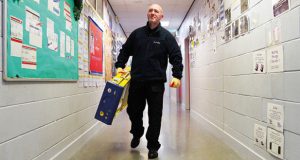Everyone has contingency plans for a possible future event or circumstance, but did anyone really predict 2020 would see the world in lockdown? The thought of G7 countries stuck in quarantine, flights around the world cancelled, turbulent markets; this all sounds more sci-fi blockbuster than modern day Britain, but that’s unfortunately where we are, and it’s likely to take years to fully recover from such a catastrophic impact to business and personal circumstances.
Since the government’s lockdown, literally millions of people have been working from home or self-isolating. Of course, key workers have been soldiering on keeping the country going. But, as time marches on what does this mean for vacant premises, or retail parks that resemble a ‘ghost town’ and schools empty of children?
The responsibility of ensuring the security and maintenance of the country’s built infrastructure and assets within, lies firmly in the hands of facilities managers. Naturally it’s somewhat a stressful period for all, but to be accountable for the safety and security of an organisation’s premise and assets inside, whether that be a warehouse full of food, or a company’s headquarters stacked-high with the latest IT equipment, is a headache, and let’s face it, we all need a business to come back to.
So, what should we do?
The answer is simple. Each facilities manager needs to develop a bespoke security plan, preferably in partnership with a first-class security provider, to ensure the safety and security of all premises and company assets. Each business needs will be unique, a plan will vary depending on whether you still have workers on site, if employees are still coming to and from the premises it would be prudent to develop a fresh risk assessment. Consider what stock/assets you hold within your company walls and proximity to nearby towns or built-up areas? Of course, a vacant premise becomes incredibly vulnerable as soon as it is unoccupied, it becomes even more susceptible to break-ins if the assets inside are seen as desirable to those on the outside. In my opinion it’s always best to ‘prepare for the worst, rather than hope for the best’ in these uncertain times.
In a time of crisis look at all the options available to you. Consider measures to deter crime, theft, damage and think about what you’ll do in an emergency, such as a break-in, or squatters taking-up residence. The possibilities are endless, but facilities managers would do well to heed the following three-point plan.
DETER CRIME
No doubt your organisation will already have a number of security options at its disposal, but now is the time to decide if these security measures need stepping-up. For example: does your CCTV provide an adequate deterrent? Is CCTV still being monitored? Are your perimeter boundaries safe and secure, are they covered? Would you benefit from metal grills on some of your windows? What measures have you developed to keep a ‘check’ on your premise? Are groups of people likely to congregate? Are you vulnerable to squatters? Do you have goods that would be attractive to looters? Here it is probably essential that all security is stepped-up during a pandemic with a strong security guard presence on all sites to deter crime.
ALARM ACTIVATION
You may well have a well-oiled keyholding system set-up within your organisation. Think about if it’s the right thing to do, to expect a member of staff to attend an alarm activation during the current situation. Consider outsourcing your keyholding responsibilities to ensure no employee is put into a situation they are not skilled to handle or are put at risk; this will also protect your organisation from costly personal injury claims and further loss of revenue.
SECURING A PREMISE POST-EMERGENCY
Often burglars will break into a premise by vandalising a CCTV system, damaging alarm systems and breaking windows or doors. Make sure you know what you would do, should this crisis arise. If you’re working from home, ensure you have the same emergency contacts available to you as you would in your office to help you.
Remember you’ll also need a team member to attend the scene, along with the police to make an assessment of damage and stolen goods. Get your premises boarded up and secured, ensure all inventories are up-to-date for insurance claims and have a firm grip on stock control.
To secure the premises and keep assets safe, security guards will need to patrol the premises, until boarding-up or glazing services can arrive to secure the building. The CCTV and alarm system will need to be repaired/replaced, and again, until that time, you will need 24-7 security guards onsite patrolling the perimeters and buildings. In a time of crisis security services can be stretched, so ensure you partner with a professional security service provider who can demonstrate their time and movements on site – specialist GPS tracking equipment can be used to monitor guards and ensure they’ve made regular visits to each check-point whilst on duty.
Once the complex/premise is secure, review all your security processes and step them up a level to ensure another crisis is averted.
- Develop a bespoke security plan/policy to suit the needs of your organisation based upon three principles: deterrents, break-ins and securing a premise post-emergency.
- Reflect on your current security practises and step-up where necessary.
- Outsource your keyholding and let professional security guards manage alarm activations during time of crisis.
- Consider moving key high value assets to a more secure location.
- Ensure you have an up-to-date inventory of all assets – make sure you can account for any stock or asset loss during a break-in.
- Partner with a professional security company that offers GPS tracking equipment to ensure security guards are delivering a thorough, professional, accountable and transparent service.





